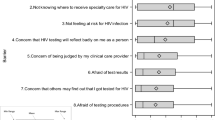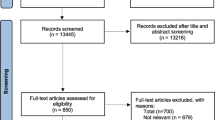Abstract
The diagnosis of HIV infection is the point of entry for treatment and prevention services, yet many infected persons in both developed and developing countries remain undiagnosed. To reduce the number of undiagnosed infections, a variety of expanded testing policies have been recommended, including opt-out testing. This testing model assumes that in populations of increased HIV prevalence, voluntary testing should be offered to all patients seen in healthcare settings and performed unless patients specifically decline. While this approach raises ethical issues concerning “voluntariness”, access to care, and stigma, the potential benefits of opt-out testing far outweigh its potential adverse effects.
Similar content being viewed by others
References
Bhaskaran, K., O. Hamouda, S. Sannes, F. Boufassa, A.M. Johnson, P.C. Lambert, et al. 2008. Changes in the risk of death after HIV seroconversion compared with mortality in the general population. Journal of the American Medical Association 300: 51–59. doi:10.1001/jama.300.1.51.
Bayer, R., and A.L. Fairchild. 2006. Changing the paradigm for HIV testing—The end of exceptionalism. The New England Journal of Medicine 355: 647–649. doi:10.1056/NEJMp068153.
Centers for Disease Control. 1985. Provisional Public Health Service inter-agency recommendations for screening donated blood and plasma for antibody to the virus causing acquired immunodeficiency syndrome. Morbidity and Mortality Weekly Report 34: 75–78.
Centers for Disease Control and Prevention. 2001a. Revised recommendations for HIV screening of pregnant women. MMWR. Recommendations and Reports, 50(RR19): 59–86.
Centers for Disease Control and Prevention. 2001b. Revised guidelines for HIV counseling, testing, and referral. MMWR Recommendations and Reports 50 (RR19): 1–58.
Centers for Disease Control and Prevention. 2003. Advancing HIV prevention: New strategies for a changing epidemic—United States, 2003. Morbidity and Mortality Weekly Report 52: 329–332.
Centers for Disease Control and Prevention. 2006. Revised recommendations for HIV testing of adults, adolescents, and pregnant women in health-care settings. MMWR. Recommendations and Reports, 55(RR14): 1–17.
Collaborative Group on AIDS Incubation and HIV Survival. 2000. Time from HIV-1 seroconversion to AIDS and death before widespread use of highly-active antiretroviral therapy: A collaborative re-analysis. Lancet 355: 1131–1137. doi:10.1016/S0140-6736(00)02061-4.
Connor, E.M., R.S. Sperling, R. Gelber, P. Kiselev, G. Scott, M.J. O’Sullivan, et al. 1994. Reduction of maternal-infant transmission of human immunodeficiency virus type 1 with zidovudine treatment. The New England Journal of Medicine 331: 1181–1187. doi:10.1056/NEJM199411033311801.
Donaldson, L., and C. Beasley. 2007. Improving the detection and diagnosis of HIV in non-HIV specialties including primary care. http://www.medfash.org.uk/publications/documents/Improving_the_detection_&_diagnosis_of_HIV_13_09_07.pdf Accessed 1 March 2009.
Gostin, L.O. 2008. HIV screening in health care settings. Public health and civil liberties in conflict. Journal of the American Medical Association 296: 2023–2025. doi:10.1001/jama.296.16.2023.
Granich, R.M., C.F. Gilks, C. Dye, K.M. DeCock, and B.G. Williams. 2009. Universal voluntary HIV testing with immediate antiretroviral therapy as a strategy for elimination of HIV transmission: A mathematical model. Lancet 373: 48–57. doi:10.1016/S0140-6736(08)61697-9.
Hamill, M., K. Burgoine, F. Farrell, J. Hemelaar, G. Patel, D.E. Welchew, et al. 2007. Time to move towards opt-out testing for HIV in the UK. British Medical Journal 334: 1352–1354. doi:10.1136/bmj.39218.404201.94.
Health Protection Agency. 2006. A complex picture - HIV and other sexually transmitted infections in the United Kingdom. http://www.hpa.org.uk/web/HPAwebFile/HPAweb_C/1194947365435 Accessed 1 March 2009.
Marks, G., N. Crepaz, J.W. Senterfitt, and R.S. Janssen. 2005. Meta-analysis of high-risk sexual behaviour in persons aware and unaware they are infected with HIV in the United States. Implications for HIV prevention programs. Journal of Acquired Immune Deficiency Syndromes 39: 446–453. doi:10.1097/01.qai.0000151079.33935.79.
Rennie, S., and F. Behets. 2006. Desperately seeking targets: The ethics of routine HIV testing in low-income countries. Bulletin of the World Health Organization 84: 52–57. doi:10.2471/BLT.05.025536.
Weiser, S.D., M. Heisler, K. Leiter, F. Percy-de Korte, F. Tlou, S. DeMonner, et al. 2006. Routine HIV testing in Botswana: A population-based study on attitudes, practices, and human rights concerns. PLoS Medicine 3(7): 1013–1022. e261.
WHO & UAIDS. 2007. Guidance on provider-initiated HIV testing and counselling in health facilities. http://whqlibdoc.who.int/publications/2007/9789241595568_eng.pdf Accessed 1 March 2009.
WHO, UNAIDS, & UNICEF. 2008. Towards universal access: Scaling up priority HIV/AIDS interventions in the health sector. http://www.who.int/hiv/pub/towards_universal_access_report_2008.pdf Accessed 1 March 2009.




